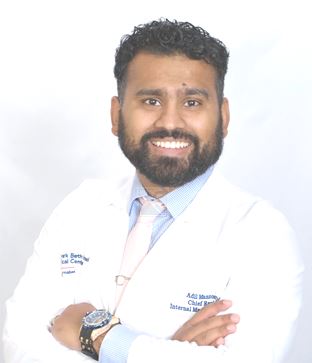THE DOCTOR IS IN

OP / ED BY DR. ADIL MANZOOR
Did you know that someone in the world develops dementia every three seconds? So, in the time you spent reading that, chances that someone somewhere has developed dementia. If you have any idea what dementia is, you will rightfully be worried about this statistic. For full clarity, though, let me briefly walk you through this condition.
Dementia is not a specific disease itself; instead, it represents a group of conditions characterized by an impaired ability to remember, think, solve problems, and make decisions. People with dementia usually see a steep drop in their social skills as well. Well, you may be thinking that your parents and grandparents often show these symptoms, and heck, even you sometimes! Does that mean you have dementia? Not exactly.
For starters, age is the biggest risk factor for dementia – by a wide margin, too. Below 65, the risk of dementia is less than 1%. However, for every five years after 65, the risk more than doubles. And, by the time you cross the 85-year mark, the risk is a staggering 25%. Despite the crystal-clear picture these figures paint, there are still almost 200,000 Americans below 65 living with dementia. Therefore, if you’re younger than 65, your risk for dementia is extremely low, but never quite zero.
Then, it is worth noting that cognitive function declines naturally with age. So, forgetting where you dropped your car keys as a middle-aged person approaching the last third of your life does not mean you are developing dementia. I promise you. As adults, you should expect a decline in cognition as you age. However, among patients with dementia, the fall is far more significant, and can severely impact their ability to handle routine daily tasks.
With that out of the way, it is also relevant to today’s discussion to consider the cause of dementia. This is a tricky area because science doesn’t really have all of the answers. However, what we do know for sure is that dementia is caused primarily by damage to the brain and its nerve cells.
The most common disease cause of dementia is Alzheimer’s, which you may very well have heard about. Alzheimer’s is responsible for up to 80% of dementia cases. There are other dementia-causing conditions, though, like dementia with Lewy bodies and frontotemporal dementia. Don’t let me bore you with the complicated science behind these conditions.
For many conditions, discovering its cause is often enough to cure and prevent it. Not dementia. This condition has no cure and cannot be prevented. Of course, this doesn’t mean that there aren’t management options for dementia. However, all of these options are geared towards slowing the progression of the condition and improving cognitive function.
Since curing dementia is not really on the cards, managing it has been an area of huge research interest. And now, a recent study has identified five lifestyle changes that are associated with better cognition among adults, even those that show signs of dementia.
This is certainly interesting, considering the programmed overreliance of medications in today’s world. These five healthy habits are: diet, late-life cognitive activities, physical activity, smoking cessation, and limited alcohol intake. Let’s briefly examine them.
Diet, in this case, involves anti-inflammatory and antioxidant foods that can help prevent oxidative damage to the brain cells. Late-life cognitive activities keep the brain active, and they include reading books, playing games, crafts, and social activities. Physical activity also comes in handy, as it assists healthy aging. The CDC recommends a minimum of 150 minutes of moderate exercise per week. Then, quitting smoking and limiting alcohol intake will also help preserve vital body organs and limit the harmful substances the body is exposed to.
This study certainly offers a fresh insight into improving cognition while aging. But, don’t forget that these lifestyle modifications will not prevent dementia or cure it. They just help the patient manage it much, much better.
This article was written by Dr. Adil Manzoor, DO, a Board-Certified Internist; Board certified Pediatrician who works as a Hospitalist and Emergency Room Physician. He is also the current President of Garden State Street Medicine, a non-profit organization whose sole purpose is to provide free preventive and acute urgent care services for the homeless. He is also the co-founder of his own unique medical practice, Mobile Medicine NJ; House Call Doctors. He is also currently pursuing an Executive MBA and a Master’s of Science in Healthcare Leadership at Samuel Curtis Johnson Graduate School of Management and the Weill Cornell Graduate School of Medical Sciences.
References
- https://www.washingtonpost.com/wellness/2024/03/16/dementia-aging-brain-diet-exercise/
- https://www.nih.gov/news-events/news-releases/combination-healthy-lifestyle-traits-may-substantially-reduce-alzheimers
- https://www.betterhealth.vic.gov.au/health/conditionsandtreatments/dementia-redu
- https://theconversation.com/aging-with-a-healthy-brain-how-lifestyle-changes-could-help-prevent-up-to-40-of-dementia-cases-211266

